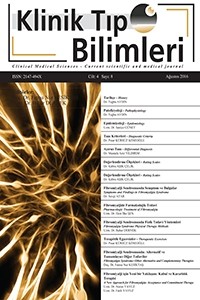Tip 2 Diyabette Güncel FarmakolojikTedavi Algoritması
Current Pharmacological Treatment Algorithmin Type 2 Diabetes
___
- Kaynaklar 1.Cornell S. Comparison of the diabetes guidelines from the ADA/EASDand the AACE/ACE J Am Pharm Assoc (2003). 2017;57(2):261-265. 2.Marathe, P.H., et al,American Diabetes Association Standards of Me-dical Care in Diabetes 2017. Diabetes Care 2017,40(Suppl. 1):66 3.Rodbard HW, Jellinger PS, Davidson JA, Einhorn D, et al. Statementby American Association of Clinical Endocrinologists/ American Col-lege of Endocrinology Consensus Panel on Type 2 Diabetes Mellitus:An algorithm for glycemic control. Endocr Pract 2009;15:540-59. 4.Canadian Diabetes Association. 2008 Clinical Practice Guidelinesfor the Prevention and Management of Diabetes in Canada. Cana-dian J Diabetes 2008;32(Suppl. 1):1-215. 5.National Institute for Health and Clinical Excellence (NICE). Type 2diabetes: the management of type 2 diabetes. 2008. (www.nice. org.uk). 6.Nathan DM, Buse JB, Davidson MB, et al. Medical management ofhyperglycemia in type 2 diabetes -a consensus algorithm for the ini-tiation and adjustment of therapy: a consensus statement of the Ame-rican Diabetes Association and the European Association for the Studyof Diabetes. Diabetes Care 2009;32:193–203. 7.Diabetes Mellitus ve Komplikasyonlarının Tanı,Tedavi ve İzlem Kı-lavuzu-2016 8.Palmer SC, Mavridis D, Nicolucci A, et al. Comparison of clinicaloutcomes and adverse events associated with glucose-lowering drugsin patients with type 2 diabetes: a meta-analysis. JAMA2016;316:313–324 9. Holman RR, Paul SK, Bethel MA, Matthews DR, Neil HAW. 10-yearfollow-up of intensive glucose control in type 2 diabetes.N Engl J Med2008;359: 1577–1589 10. Bennett WL, Maruthur NM, Singh S, et al. Comparative effectivenessand safety of medications for type 2 diabetes: an update includingnew drugs and 2-drug combinations. Ann Intern Med2011;154:602–613 11. Aroda VR, Edelstein SL, Goldberg RB, et al.; Diabetes PreventionProgram Research Group.Long-term metformin use and vitamin B12defi- ciency in the Diabetes Prevention Program Outcomes Study.J Clin Endocrinol Metab 2016;101: 1754–1761 12. Inzucchi SE, Bergenstal RM, Buse JB, et al. Management ofhyperglycemia in type 2 diabetes, 2015: a patient-centered appro-ach: update to a position statement of the American Diabetes Asso-ciation and the European Association for the Study of Diabetes. Dia-betes Care 2015;38:140–149 13. Chiasson J-L, Josse RG, Hunt JA, et al.The efficacy of acarbose inthe treatment of patients with non-insulin-dependent diabetes mel-litus. A multicenter controlled clinical trial. Ann Intern Med1994;121:928-35. 14. Kahn SE, Haffner SM, Heise MA, et al. Glycemic durability of ro-siglitazone, metformin, or glyburide monotherapy. N Engl J Med2006;355:2427-43. 15. UK Prospective Diabetes Study (UKPDS) Group. Effect of intensi-ve blood-glucose control with metformin on complications in over-weight patients with type 2 diabetes (UKPDS 34). Lancet1998;352:854-65. 16. Fakhoury WK, Lereun C, Wright D. A meta-analysis of placebo-con-trolled clinical trials assessing the efficacy and safety of incretinba-sed medications in patients with type 2 diabetes. Pharmacology2010;86:44-57. 17. Fonseca V, Rosenstock J, Patwardhan R, et al. Effect of metformin androsiglitazone combination therapy in patients with type 2 diabetes mel-litus: a randomized controlled trial. JAMA 2000;283:1695-702 18. Diamant M, Nauck MA, Shaginian R, et al.; 4B Study Group. Glu-cagon-like peptide 1 receptor agonist or bolus insulin with optimi-zed basal insulin in type 2 diabetes. Diabetes Care 2014;37:2763–2773 19. Eng C, Kramer CK, Zinman B, Retnakaran R. Glucagon-like pepti-de-1 receptor agonist and basal insulin combination treatment forthe management of type 2 diabetes: a systematic review and meta-analysis. Lancet 2014;384: 2228–2234 20. Mathieu C, Storms F, Tits J, Veneman TF, Colin IM. Switching frompremixed insulin to basal-bolus insulin glargine plus rapid-actinginsulin: the ATLANTIC study. Acta Clin Belg 2013; 68:28–33 21. Dieuzeide G, Chuang L-M, Almaghamsi A, Zilov A, Chen J-W, La-valle-Gonzalez FJ. Safety ´ and effectiveness of biphasic insulin as-part 30 in people with type 2 diabetes switching from basal-bolus in-sulin regimens in the A1chieve study. Prim Care Diabetes2014;8:111–117 22. Giugliano D, Chiodini P, Maiorino MI, Bellastella G, Esposito K.Intensification of insulin therapy with basal-bolus or premixed in-sulin regimens in type 2 diabetes: a systematic review and meta-analy-sis of randomized controlled trials. Endocrine 2016;51:417–428
- ISSN: 2147-494X
- Başlangıç: 2013
- Yayıncı: Selen Medya Yayıncılık Tanıtım ve Organizasyon Hizmetleri
Diyabetli Hastalarda Egzersiz Reçetesi
Pankreas Adacık Transplantasyonu Çalışmalarındaki Son Durum
Doç. Dr. Süleyman Hilmi İPEKÇİ
Metabolik Cerrahi Sonrası DiyabetliHastanın Beslenmesi
Yrd. Doç. Dr. Dyt. Nihal Zekiye ERDEM
Çocuk ve Adolesanlarda Tip-2 Diyabetin Tanısı ve Yönetimi
Diabetes Mellitus’ta Hiperlipidemi ve Hipertansiyon Tedavi İlkeleri
Tip 1 Diyabetli Bir Hastanın Tedavi veİzlemindeki Püf Noktaları
Tip 2 Diyabette Güncel FarmakolojikTedavi Algoritması
Pregestasyonel Diyabeti Olanlarda Rehberlik, Tedavi ve İzlem
İnsülin Direnci İçin Pratik Değerlendirme Yöntemleri ve Yaklaşım
